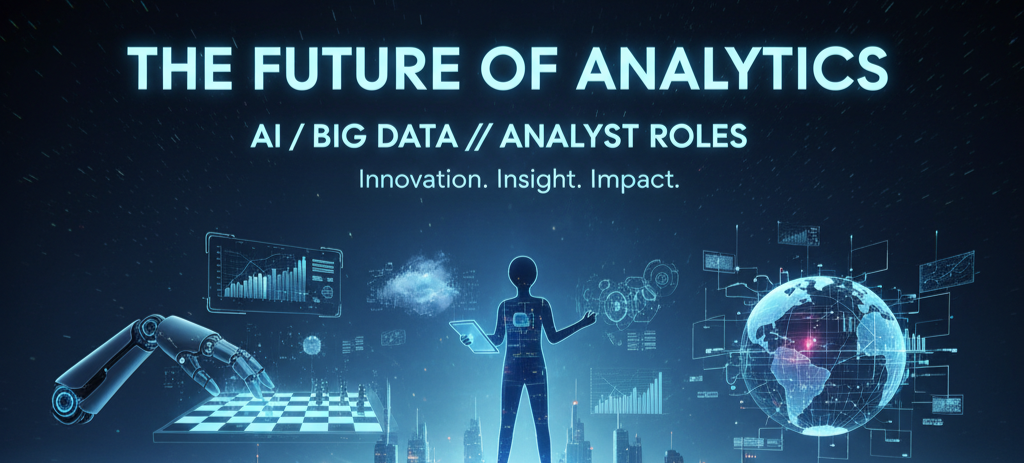Introduction
The field of analytics is undergoing a substantial transformation. Previously dependent on manual reporting, spreadsheets, and descriptive insights, it has now progressed into a complex ecosystem powered by artificial intelligence (AI) and big data. Companies in various sectors are moving towards real-time decision-making, predictive modeling, and automation, rendering analytics more essential than ever. This new phase is not merely about improved tools it involves reimagining how businesses understand information and how professionals adjust to stay pertinent.
How AI Is Reshaping Data Analysis
AI has redefined the traditional boundaries of analytics by automating complex tasks that once required significant human effort. Machine learning models can identify hidden patterns, predict outcomes, and even recommend actions in a fraction of the time.
- Automation of Repetitive Tasks: Data cleaning, anomaly detection, and reporting are increasingly handled by AI.
- Predictive Capabilities: Instead of looking backward, businesses can now forecast consumer behavior, market trends, and operational risks with greater accuracy.
- Scalability: AI tools can process massive data sets in real-time, something nearly impossible for human analysts to achieve manually.
The result is not the elimination of analysts but rather the creation of a partnership AI handles volume and complexity, while humans focus on interpretation and strategy.
Big Data: Opportunity or Overload?
Big data has emerged as both a significant asset and a formidable challenge. With billions of data points produced each day through digital interactions, sensors, and transactions, organizations now possess more information than ever before.
- Opportunity: Big data facilitates enhanced customer insights, better supply chain management, and competitive market intelligence.
- Overload: Without proper systems, organizations can be overwhelmed by data, losing the ability to gain meaningful insights.
- Data Governance: The ethical management, protection of privacy, and adherence to compliance have become essential as businesses manage sensitive information.
Big data’s value comes from how effectively it’s analyzed, contextualized, and applied in decision-making.
Are Traditional Analyst Roles at Risk?
Big data has emerged as both a significant asset and a formidable challenge. Billions of daily data points offer insights and opportunities, but without proper systems, their volume can overwhelm organizations. Effective data governance has therefore become essential, emphasizing the ethical management of data, the protection of privacy, and adherence to compliance standards, particularly as businesses handle increasingly sensitive information. Big data is both a valuable asset and a challenge. While billions of daily data points offer insights, proper systems and governance are essential to manage volume, ensure privacy, and maintain compliance. Its true value lies in effective analysis, contextualization, and application for informed decision-making.

The Shift Toward Data-Driven Decision Making
Analytics has transitioned from a supportive role to a fundamental driver of business strategy. Decision-making is no longer based on intuition alone but reinforced by data-backed evidence.
- Real-Time Insights: Businesses can adjust pricing, marketing, or inventory instantly based on data trends.
- Cross-Department Impact: From HR to finance to operations, analytics now shapes every organizational function.
- Competitive Advantage: Companies leveraging data-driven strategies consistently outperform peers who rely on traditional decision-making.
The shift toward data-driven cultures is not optional it is becoming the standard expectation in competitive markets.
New Skills Every Analyst Will Need
The analytics profession is undergoing significant changes, necessitating a more extensive skill set than ever before. Analysts today are required to merge technical proficiency with interpersonal skills to succeed.
- Technical Mastery: Proficiency in machine learning, SQL, Python, R, and cloud-based platforms has become essential prerequisites.
- Data Storytelling: Analysts are expected to convert intricate findings into straightforward, actionable insights for stakeholders.
- Business Acumen: A grasp of industry-specific dynamics enables analysts to link data insights to tangible real-world effects.
- Adaptability: As technology advances rapidly, ongoing education is now a requirement rather than an option.
Analysts who are prepared for the future will be those who adopt interdisciplinary learning, integrating data science with effective communication and strategic thought.
Balancing Human Insight With Machine Intelligence
Although AI is capable of processing large volumes of data efficiently, the value of human judgment is irreplaceable. Machines excel at analyzing numbers quickly but lack the contextual awareness and ethical reasoning that humans provide. Analysts are able to interpret results within cultural, political, and business environments insights that AI cannot fully grasp. Moreover, human oversight is essential for ethical considerations, as biases in data and algorithms require careful review to ensure fairness and accountability. Humans also play a critical role in strategic alignment, ensuring that data-driven decisions support long-term business goals rather than focusing solely on short-term efficiencies. The future of decision-making lies in collaboration: AI enhances analytical capabilities, while humans contribute wisdom, empathy, and vision.
Conclusion
Analytics has transitioned from merely analyzing past events to forecasting future occurrences and facilitating more informed decision-making.Artificial Intelligence and big data are transforming the industry, yet human insight remains the foundation of significant analysis. For professionals, maintaining relevance hinges on the adoption of innovative tools, the development of advanced competencies, and the adjustment to a data-centric culture.
Platforms like Wiraa connect professionals globally, meeting the demand for digital-first skills. By enabling analysts, data scientists, and business leaders to present their abilities and engage with international employers, Wiraa is contributing to the evolution of work in analytics. As the industry continues to change, those who integrate human insight with machine intelligence will not only succeed but also shape the future of business decision-making.




